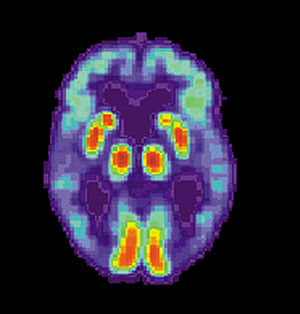A new invention in the research study of Alzheimer’s disease; a
defective mutant strain of a bacterium that is responsible for gingival
or periodontal disease can provide clue for the effective treatment of
Alzheimer’s disease.
This was published by the research dentists of University of Florida
College of dentistry.
Neurological disorders like Parkinson’s disease and Alzheimer’s are
associated with the built up of polypeptides within the nerve cells.
The process of self destruction of cells against invading bacteria is
found as a normal phenomenon in any inflammative condition.

Image via Wikipedia
The amino acids that are produced as a result of this auto eating is
reused for the formation of new cells. The recent studies suggest that
this rule is applicable to neuro degenetive diseases too. If the cells are activated for the process of self eating or
autophagy, the chances of recovery are high.
Findings in Alzheimer’s disease
The clumped proteins as a result of the degeneration of cells result
in the formation of plaque in the nerve cells of the Alzheimer’s
patient.
If the cells are activated to destruct these waste products, the
plaque formation can be prevented and there by reduce further
development of the disease.
Gingivitis is a common condition in Alzheimer’s patients. However, a
mutant strain of P.gingivalis, the organism that causes gingivitis does
not show the autophagic property.
New studies are conducted to understand how autophagy can be turned
on in this organism and the result is expected to be a limelight for the
clinicians in the treatment of Alzheimer’s disease.

![Reblog this post [with Zemanta]](http://img.zemanta.com/reblog_e.png?x-id=3e309138-f351-4de4-b856-68400b3d9c30)








